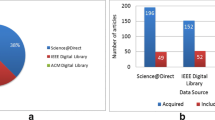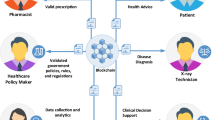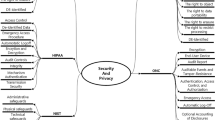Abstract
Advising students through their study plans is one of the essential steps towards academic success. The matching of students’ needs and courses offered at a university requires comprehensive planning and scheduling. To avoid the problem of mismatch, which usually leads to cancellation courses with low enrollment, a decisive advising process is deemed necessary. Although such a topic received attention from previous work in the area, we could not trace any research references to the use of blockchain in solving the complex advising process. This research explores a topic that is still in its infancy. Blockchain is a new technology proposed to create an effective advising system based on a decisive preregistration process. The proposed system has adopted a hybrid approach integrating the client-server legacy centralized methodology with the blockchain decentralized approach. Ethereum blockchain network is used in the proposed system to create a consensus-validated advising environment. The smart contracts used in such a system offer the students the freedom to modify the courses selections, based on the map of several students tentatively registered in the courses at any particular time. The proposed system has been analyzed, designed, implemented, and applied empirically on students’ records extracted from the Banner Enterprise Resources Planning (Banner-ERP) system. The results are promising and provide a proof of concept. The experimental results have also been compared with students’ course requirements reaching a satisfactory level of efficiency in the advising process.






Similar content being viewed by others
References
Abouchedid, K., & Nasser, R. (2002). Assuring quality service in higher education: Registration and advising attitudes in a private university in Lebanon. Quality Assurance in Education. https://doi.org/10.1108/09684880210446866
Albalooshi, F., & Shatnawi, S. (2010). Online academic advising support, in technological developments in networking, education and automation, springer, pp. 25–29. https://doi.org/10.1007/978-90-481-9151-2_5.
Andrews, T., & Tynan, B. (2012). Distance learners: Connected, mobile and resourceful individuals. Australasian Journal of Educational Technology, 28(4). https://doi.org/10.14742/ajet.828
Aslam, M.Z, Khan, A. R. (2011). A proposed decision support system/expert system for guiding fresh students in selecting a faculty in Gomal University, Pakistan. arXiv preprint arXiv:1104.1678.
Christidis, K., & Devetsikiotis, M. (2016). Blockchains and smart contracts for the internet of things. IEEE Access, 4, 2292–2303. https://doi.org/10.1109/ACCESS.2016.2566339
Coll, J. E. (2008). A study of academic advising satisfaction and its relationship to student worldviews. Journal of College Student Retention: Research, Theory & Practice, 10(3), 391–404. https://doi.org/10.2190/CS.10.3.g
Daramola, O., Emebo, O., Afolabi, I.T, & Ayo, C. K. (2014). Implementation of an Intelligent Course Advisory Expert System. International Journal of Advanced Research in Artificial Intelligence (IJARAI), 3(5), pp. 6–12. https://doi.org/10.14569/IJARAI.2014.030502
Engin, G., Aksoyer, B., Avdagic, M., Bozanlı, D., Hanay, U., Maden, D., & Ertek, G. (2014). Rule-based expert systems for supporting university students. Procedia Computer Science, 31, 22–31. https://doi.org/10.1016/j.procs.2014.05.241
Grech, A. and Camilleri, A. F. (2017) Blockchain in education. Inamorato dos Santos, A. (ed.) EUR 28778 EN; https://doi.org/10.2760/60649.
Greenspan, G. (2015). Avoiding the pointless blockchain project. Online at https://www.multichain.com/blog/2015/11/avoiding-pointless-blockchain-project. Accessed 10 Aug 2021
Henderson, L. K., & Goodridge, W. (2015). AdviseMe: An intelligent web-based application for academic advising. International Journal of Advanced Computer Science and Applications (IJACSA), 6(8). https://doi.org/10.14569/IJACSA.2015.060831
Herrmann, M., Petzold, J., & Bombatkar, V. (2018). Blockchain-backed analytics. Adding blockchain-based quality gates to data science projects. In 2nd international conference on advanced research methods and analytics (CARMA 2018). Proceedings. https://doi.org/10.4995/CARMA2018.2018.8292.
Hou, H. (2017) The application of Blockchain technology in E-government in China. IEEE 26th International Conference on Computer Communication and Networks (ICCCN). https://doi.org/10.1109/ICCCN.2017.8038519.
Hwang, G. J., Chen, C. Y., Tsai, P. S., & Tsai, C. C. (2011). An expert system for improving web-based problem-solving ability of students. Expert Systems with Applications, 38(7), 8664–8672. https://doi.org/10.1016/j.eswa.2011.01.072
Iatrellis, O., Kameas, A., & Fitsilis, P. (2019). A novel integrated approach to the execution of personalized and self-evolving learning pathways. Education and Information Technologies, 24(1), 781–803. https://doi.org/10.1007/s10639-018-9802-7
Kundu, D. (2019). Blockchain and trust in a smart city. Environment and Urbanization ASIA, 10(1), 31–43. https://doi.org/10.1177/0975425319832392
Laghari, M., & Khawaja, G. (2012). Student advising & planning software. Int. Journal on New Trends in Education and Their Implications, 3(3), 158–175.
Laghari, M. (2014). Automated course advising system. International journal of machine learning and computing, 4(1), February 2014. https://doi.org/10.7763/IJMLC.2014.V4.384.
Laghari, M., Al Habsi, S. A. A., Maaz, A., & Al Naqbi, A. (2015). A one-semester course planner for EE students. International research journal of electronics & computer. Engineering, 1(1). https://doi.org/10.24178/irjece.2015.1.1.13
Loukil, F., Abed, M., & Boukadi, K. (2021). Blockchain adoption in education: A systematic literature review. Education and Information Technologies, 1–19 https://doi.org/10.1007/s10639-021-10481-8.
McBeath, C., & Atkinson, R. (1992). Curriculum, instructional design and the technologies: Planning for educational delivery. Australasian Journal of Educational Technology, 8(2). https://doi.org/10.14742/ajet.2251
Mohamed, A. (2016). Interactive decision support for academic advising. Quality Assurance in Education. https://doi.org/10.1108/QAE-03-2013-0011
Mselmi, A. (2020). Blockchain technology and systemic risk. International journal of economics and financial Issues, 10(2). 53–60. https://doi.org/10.32479/ijefi.9069.
Nakamoto, S. (2009). Bitcoin: A peer-to-peer electronic cash system. Cryptography Mailing list.
Nguyen, V. A., Nguyen, H. H., Nguyen, D. L., & Le, M. D. (2021). A course recommendation model for students based on learning outcome. Education and Information Technologies, 1-27. https://doi.org/10.1007/s10639-021-10524-0.
Nwagu, K., Omankwu N., & Obinnaya C. (2018). An intelligent advising system that adopts multi-agents technology. International Journal of Scientific & Engineering Research, 9(11).
Paik, H. Y., Xu, X., Bandara, H. D., Lee, S. U., & Lo, S. K. (2019). Analysis of data Management in Blockchain-Based Systems: From architecture to governance. IEEE Access, 7, 186091–186107. https://doi.org/10.1109/ACCESS.2019.2961404
Patil, S., & Puranik, P. (2019). Blockchain technology. International Journal of Trend in Scientific Research and Development, 3. https://doi.org/10.31142/ijtsrd23774
Pechenkina, E. (2017). Developing a typology of mobile apps in higher education: A national case-study. Austalasian Journal of Education Technology, 33(4). https://doi.org/10.14742/ajet.3228
Pizzolatto, J. (2006). Complex partnerships: Self-authorship and provocative academic advising practices. NACADA Journal, 26(1). https://doi.org/10.12930/0271-9517-26.1.32
Siegfried, R. M., Wittenstein, A. M., & Sharma, T. (2003). An automated advising system for course selection and scheduling. Journal of Computing Sciences in Colleges, 18(3), 17–25.
Shatnawi, R., Althebyan, Q., Ghalib, B., & AlMaolegi, M. (2014). Building a Smart Academic Advising System Using Association Rule Mining. arXiv preprint arXiv:1407–1807.
Streufert, B. (2019). Advising alternatives: A case study. NACADA Review, 1(1), 14–29. https://doi.org/10.12930/NACR-18-1011
Van den Wijngaard, O. (2019) Academic advising: A discipline of praxis. NACADA review: 2019, 1(1), pp. 5-13. https://doi.org/10.12930/NACR-18-1020.
Wang, X., Yu, P., Yu, G., Zha, X., Ni, W., Liu, R. P., & Guo, Y. J. (2019, December). A high-performance hybrid Blockchain system for traceable IoT applications. In International Conference on Network and System Security (pp. 721–728). Springer, Cham. https://doi.org/10.1007/978-3-030-36938-5_47.
Werghi, N., & Kamoun, F. K. (2009). A decision-tree based system for student academic advising and planning in information systems programmes. International Journal of Business Information Systems, 5(1), 1–18. https://doi.org/10.1504/IJBIS.2010.029477
Young-Jones, A. D., Burt, T. D., Dixon, S., & Hawthorne, M. J. (2013). Academic advising: Does it really impact student success? Quality Assurance in Education. https://doi.org/10.1108/09684881311293034
Author information
Authors and Affiliations
Corresponding author
Ethics declarations
Statements on open data, ethics and conflict of interest
Survey questions and data may be requested from the author. This work complies with the PMU ethical and cultural rules. The author has no interest or involvement with any institution on regards of this research.
Additional information
Publisher’s note
Springer Nature remains neutral with regard to jurisdictional claims in published maps and institutional affiliations.
Rights and permissions
About this article
Cite this article
Al-Imamy, S.Y., Zygiaris, S. Innovative students’ academic advising for optimum courses’ selection and scheduling assistant: A Blockchain based use case. Educ Inf Technol 27, 5437–5455 (2022). https://doi.org/10.1007/s10639-021-10844-1
Received:
Accepted:
Published:
Issue Date:
DOI: https://doi.org/10.1007/s10639-021-10844-1




